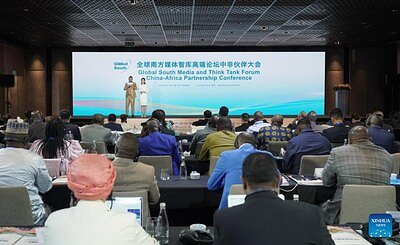
China & Africa Forge Deeper Ties, Amplifying Global South's Voice
A new partnership plan aims to boost media & think tank collaboration between China & Africa, signaling a growing ambition to shape global narratives & challenge existing power structures.
China & Africa Forge Deeper Ties, Amplifying Global South's Voice
By George Millen
BEIJING – A new initiative launched at the Global South Media and Think Tank Forum signals a deepening strategic partnership between China and African nations, aiming to amplify the collective voice of the Global South on the international stage. The “United in Heart, Path and Action – 2026 China-Africa Partnership Empowerment Action Plan” promises increased collaboration in media, research, and advocacy, but also raises questions about debt sustainability, transparency, and the potential for a reshaped global order.
A Growing Partnership Built on Economic Ties
For over two decades, China has been Africa’s largest trading partner, and the relationship continues to expand. In 2024, trade volume reached a record $295.6 billion, driven by Chinese investment in infrastructure – roads, railways, ports – and a growing demand for African natural resources. This economic engagement is framed as “South-South cooperation,” offering an alternative development model to traditional Western aid.
“The sheer scale of Chinese investment is undeniable,” noted one independent analyst. “It’s filling critical infrastructure gaps that African governments have struggled to address for years. But it’s not without its complexities.”
Amplifying Voices & Shaping Narratives
The newly launched action plan, spearheaded by Xinhua News Agency, seeks to synchronize media and think tank efforts between China and Africa. With over 1,000 organizations now part of the Global South Media and Think Tank Cooperation and Communication Partner Network, the initiative aims to establish a cohesive narrative that promotes shared interests and challenges existing power structures.
“The goal is to ensure the perspectives of the Global South are not just heard, but actively shape the global conversation,” a source familiar with the plan stated. “This is about building a platform for alternative viewpoints on issues ranging from climate change to global governance.”
Navigating the Complexities: Debt, Transparency, and Influence
While the economic benefits of Chinese engagement are apparent, concerns persist about debt sustainability. As of 2020, Chinese lenders held approximately 12% of Africa's external debt, and the cumulative debt owed to China has risen dramatically in recent years. Critics argue that this reliance on Chinese loans could create a “debt trap,” potentially giving China undue leverage over African nations.
“The debt issue is a legitimate concern,” admitted one African diplomat. “We need to be mindful of responsible borrowing and ensure that projects are viable and contribute to long-term economic growth.”
Transparency is another key challenge. Concerns have been raised about the lack of openness surrounding loan agreements and the potential for corruption. Some analysts also suggest that Chinese companies operating in Africa sometimes prioritize profit over environmental and social responsibility.
“There’s a need for greater transparency in all aspects of the relationship,” said one researcher specializing in China-Africa relations. “African governments need to be able to scrutinize loan agreements and ensure that projects are aligned with their national development priorities.”
Furthermore, the growing influence of Chinese state-backed media in Africa has raised questions about media freedom and the potential for censorship. While China argues that it is simply providing alternative viewpoints, critics worry that this could stifle independent journalism and limit critical reporting.
A Reshaped Global Order?
The deepening China-Africa partnership is occurring against the backdrop of a shifting global order. The rise of China as a major economic and political power is challenging the traditional dominance of the West, and the growing emphasis on multipolarity is creating new opportunities for the Global South.
The “United in Heart” action plan explicitly aims to promote a more “just and rational international order,” and to strengthen the collective voice of the Global South in global governance forums. This ambition is evident in China’s increasing advocacy for reforms to international institutions like the United Nations, and its efforts to promote alternative approaches to issues like climate change and development.
“We’re seeing a clear attempt to build a counterweight to the existing global order,” observed one geopolitical analyst. “China and Africa are forging a strategic alliance based on shared interests and a desire for greater autonomy.”
The Path Forward: Balancing Opportunity and Risk
The deepening China-Africa partnership presents both opportunities and risks. For African nations, it offers access to much-needed infrastructure, investment, and development assistance. For China, it provides access to natural resources, new markets, and a valuable strategic partner.
However, it also requires careful navigation of the challenges related to debt sustainability, transparency, and influence. African governments must prioritize responsible borrowing, promote good governance, and safeguard media freedom. China, for its part, must demonstrate a commitment to transparency, environmental responsibility, and mutually beneficial partnerships.
The success of this partnership will ultimately depend on the ability of both sides to build a relationship based on trust, mutual respect, and a shared vision for a more just and equitable world. The “United in Heart” action plan is a significant step in that direction, but it is only the beginning of a long and complex journey.
